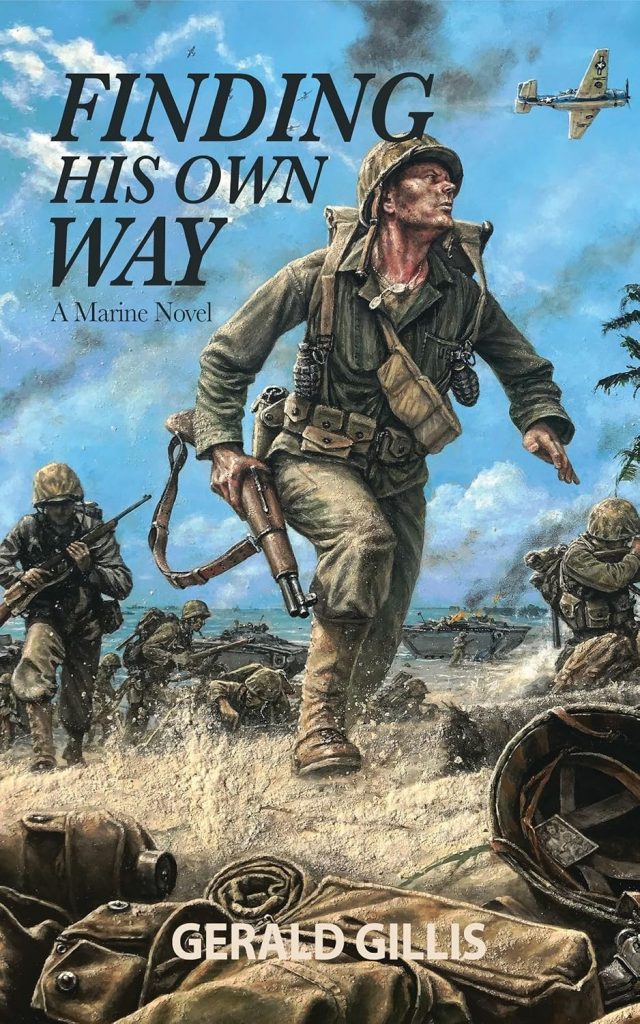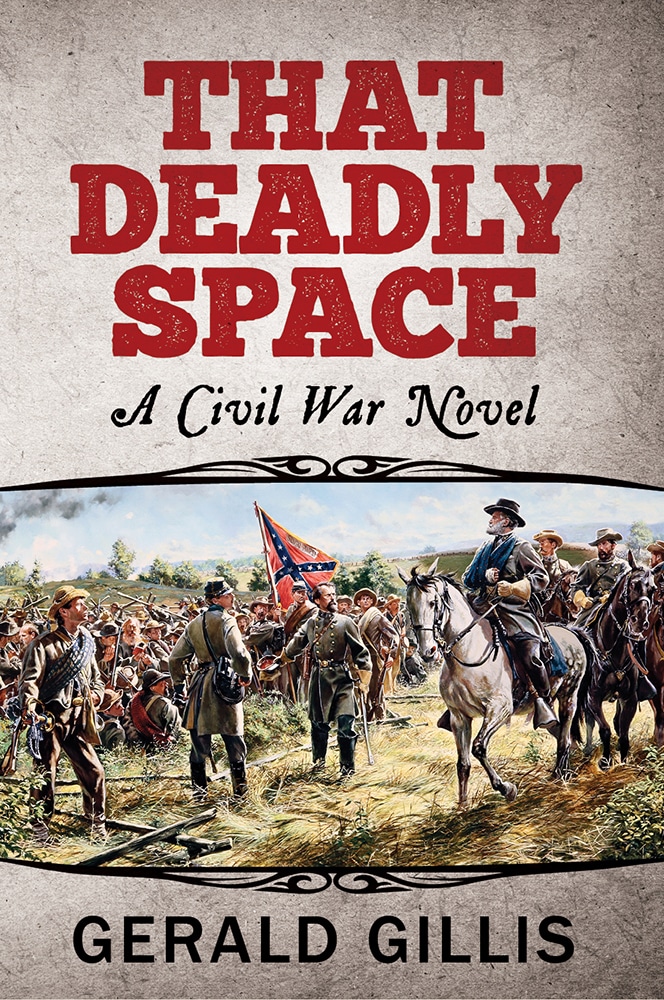Excerpted from That Deadly Space, depicting an event near the end of the first day of the Battle of Gettysburg:
“Sir, they’s Yankee snipers all up in them houses yonder. We’ve had three men shot at in the last half-hour.”
“I need to get a look at Cemetery Hill. What do you suggest?”
“That thing’s crawling with Yankees, sir. Listen and you can hear ‘em diggin’ in up there.”
“I need to do more than hear them, Corporal. Is there a house close by that has a rooftop I could get on?”
The corporal pointed to a house across the street. “I’ve got a sniper on the roof of that house right there. A good bit of Cemetery Hill’s in view from up there. Follow me, Major.”
Conor tied Shannon to a post outside the two-story home and followed the corporal inside. There were at least a dozen wounded soldiers from both sides being treated by several women. He stepped around and over them and followed the corporal to a staircase that led to the roof. The sniper on the roof glanced at Conor but otherwise kept his eyes ahead in search of targets.
“Might wanna scrunch over, sir. Don’t make yourself—“
The Confederate sniper suddenly fired at an opposing shooter on a rooftop across the street, perhaps seventy-five yards distant. The Yankee soldier slumped forward and dropped his rifle, his arms dangling and his body nearly tumbling off the roof. Blood began streaming down the side of the house.
“Good ‘un, James,” the corporal said. “I’ll bet that’s the same sumbitch tried to pop ole Red while ago.”
Conor scrunched over.
As he looked through his field glasses in the fading light, Conor could see the Federal soldiers who had been running for their lives earlier in the day now furiously digging holes and piling rocks and fence rails in front of their positions. A tall, imposing officer on horseback moved about the men in a calm, deliberate manner, giving orders to other officers, occasionally personally directing the placement of cannons or troops. He would sometimes stop and say something that would cause a group of soldiers to laugh in that particularly loud, rowdy way that soldiers cackle at lewd comments. It was clear that these men had retreated as far as they intended, and they were now preparing a defensive position that would take an exacting toll on any attacker. Conor made a sketch of what he could see and an estimate of the number of Federal soldiers he thought were occupying the hill. He then got up to leave the rooftop.
The corporal noticed the missing little finger on Conor’s writing hand. “Yankee ball take off that finger, sir?”
“Yep. I suppose it’s still out there somewhere on that sunken road at Sharpsburg.”
“We was both there,” the corporal proudly announced with a point toward his sniper buddy. “Now that was a fight.”
“You goin’ up that hill, Major?” the young sniper asked Conor as he was leaving.
“I think so,” he answered. “Better now than later.”
He gave a reluctant nod. “Good luck, whenever you do.”
There was an attractive young woman on the second floor of the house who was leaning back and resting in a chair when Conor came back inside. She appeared to be about his age, with blond hair and blue eyes, of medium height and build. She glanced up at Conor with a tired expression as he approached. When she saw his uniform, she quickly avoided eye contact.
“Do you live here, ma’am?” Conor asked.
“It’s my mother’s house, but I live here, yes,” she replied, still without looking at Conor.
“This has been some day, huh?”
She frowned, but said nothing.
Conor reached an outstretched hand toward her. “I’m Major Conor Rafferty.”
She hesitated a moment, staring at his hand and then noticing the missing finger. She soon relented and gave him a firm handshake, finally making eye contact. “Amanda Wiedenour.”
“Thank you for looking after these wounded men, Amanda. I was injured at Sharpsburg and I’ll always appreciate the help I was given in the home of a private citizen.”
“I would have much preferred that you and your soldiers had never come to our peaceful little town. Things will never be the same for us now. This is going to become nothing but a disaster, a disaster on a huge scale, thanks to you,” she said, her voice breaking. “My brother’s out there somewhere, and this man you’ve got on our roof could be aiming his gun at him, for all I know.”
“My brother’s out there somewhere too, Amanda. I’m sorry you and your mother had to be pulled into this. I truly am.”
“I’m sorry any of us in Gettysburg had to be pulled into this,” she said, her tears streaming down her cheek.
Conor attempted to change the subject. “What do you do when there’s not a war going on in the middle of your town?”
She looked at him in disgust.
“Yes, you’re right. Those were poorly chosen words. I apologize, ma’am. I promise you I didn’t mean that to be as callous as it sounded. Please forgive my rather clumsy attempt at humor.”
She looked away.
“Let me try again. What do you do to make a living?”
“I’m a seamstress,” she said, wiping her eyes with the bottom of her apron.
“Ah,” he said. “I’m sure you’re a good one.”
“I am a good one. Are you good at what you do?”
“Well, I try to be. I had expected to become a lawyer but things obviously changed for me, as they did for most of us. I’ve spent nearly six months recovering in hospitals since I joined the army, so the lawyering way of life has an even greater appeal to me now.”
She laughed out loud but quickly caught herself, cleared her throat, and resumed her rigid demeanor. “What were you doing on our roof?”
“Looking for a good restaurant. I haven’t eaten in days, it seems.”
“I believe that, sure.”
“Of course you do.”
“Did you see what you went up there to see?”
“I think we should talk about other things, ma’am.”
“Like what? Like how much we’re all enjoying our daily lives here in Gettysburg since your army showed up?”
“That wouldn’t be at the top of the list of the things I’d care to talk about. Maybe I should just leave.”
She took a deep breath. “So where is your home?”
“Georgia, near Atlanta. I haven’t been home in two years.”
“That’s a long time,” she said softly. “Did you leave a girl behind?”
“Well, not really,” Conor said with a chuckle.
“Is she pretty?”
“Uh, yes, very. Her name is Patricia Welch. She’s a schoolteacher.”
“So what happened?”
“She wanted to get married, and honestly I was just about to propose, I really was. But then the war started and I cooled on the idea.”
“So you just up and left?”
“Pretty much, yeah,” Conor said with a chuckle as he remembered his conversation with Rebecca Gordon in Richmond.
“Boy, you’re a real prize.”
“I know. I’m not sure anyone will ever have me now.”
“Oh, I’m sure you could have your pick of those pretty Southern belles,” she said in an exaggerated accent.
Conor smiled. “What about you? Are you married or spoken for?”
“No, neither. That is probably the only thing we have in common, but not for the same reasons. Your Rebel army at Fredericksburg, Virginia killed my boyfriend. We were making plans for after the war.”
“I’m very sorry.”
She gave him a hard stare.
Conor again decided to change the subject. “Our regular soldiers who are coming into your home, like the men on the roof, are they being respectful?”
She shrugged. “They’re polite, yeah. But I’d rather not have them here at all if you want to know the truth about it.”
“I understand. They’re just doing what they’re told, Amanda, like the rest of us.”
“Then tell them to go someplace else.”
“I’m sorry, but I can’t do that.”
She sighed. “I just hope this whole nightmare ends soon.”
Conor nodded. “We agree on that. Well, I really should go now.”
She looked at him with reddened eyes and said, “Yes, you probably should.”
Conor turned to leave but then stopped and asked, “Do you have enough food and water?”
“No,” she answered quickly. “We’ll be out of both soon. And we need bandages. We’ve used up all the sheets in the house. But we’re really starting to feel desperate about the food and water. Please, help us if you can.”
“I’ll see to it right away. I can’t promise anything, but I’ll do what I can.”
Conor held out his hand again and she took it.
“God bless you, Amanda Wiedenour.”
Conor walked down the stairs and back through the open part of the house where the wounded were lying. He stopped and spoke briefly to the three wounded Confederates, all of whom were conscious and aware, and then started toward the door.
“Major?” she called from the top of the stairs.
He turned and heard Amanda say, “Please don’t forget about the food and water.”



